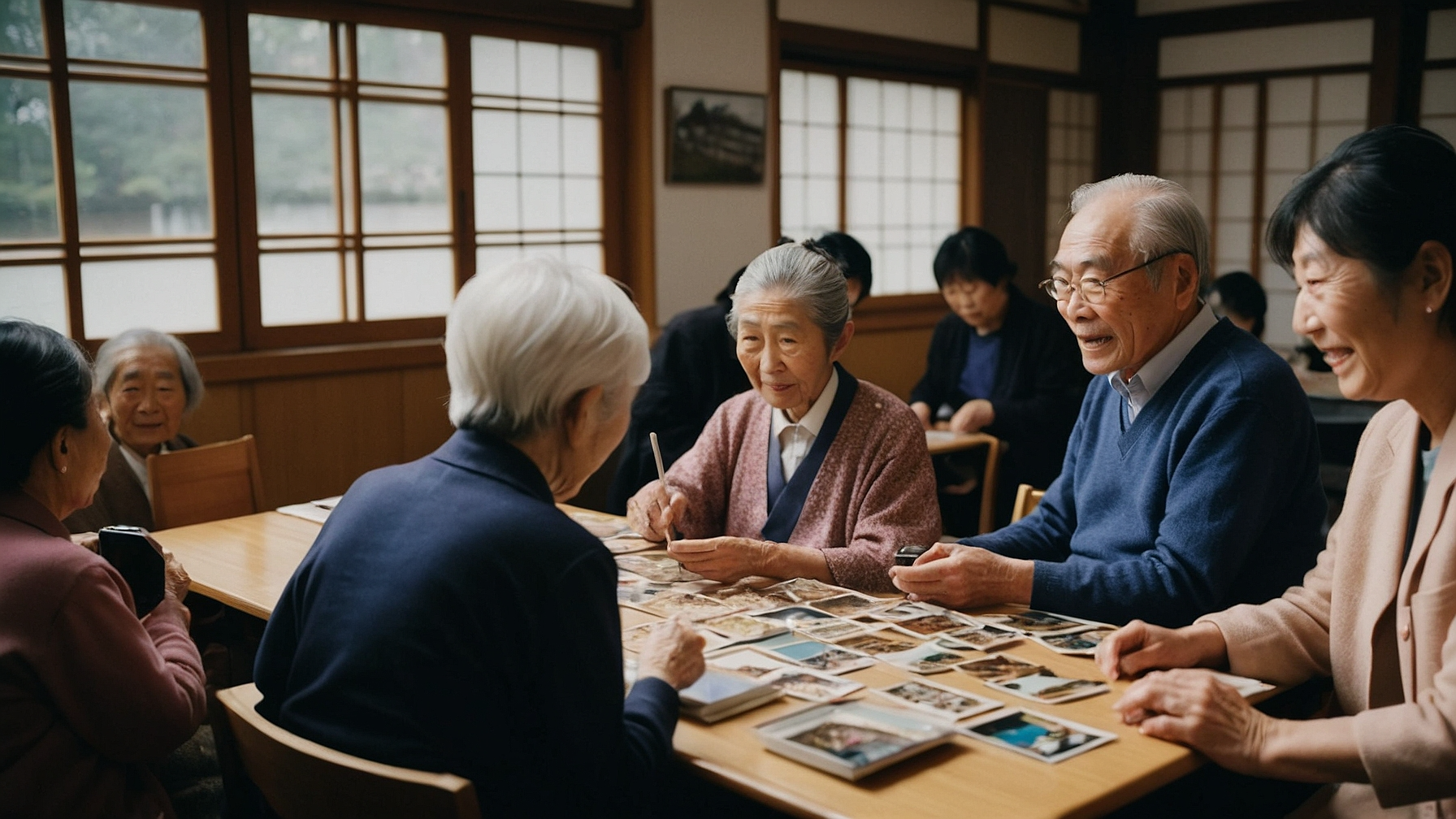In a world that feels more connected than ever, the sad reality is that far too many people are experiencing loneliness. The loneliness epidemic is a growing concern that touches the lives of young and old alike. Have you ever felt alone in a crowd of people? Or know someone who struggles with the stigma surrounding loneliness?
Feeling lonely is not just an emotional burden; it has serious health outcomes. Modern life often leaves older adults and young people feeling isolated and disconnected. Countries like the UK and young Japan have recognized this crisis and have taken steps to address it by appointing a Minister of Loneliness. This innovative role is designed to tackle loneliness nationally, aiming to improve social connections and mental health.
As we delve into the efforts of different countries to combat this pervasive issue, we will see how they are striving to make a difference. Their work is a beacon of hope for millions suffering in silence. Let’s explore how these nations reduce loneliness and foster a sense of community belonging.
Background

History and Origin of the Minister of Loneliness
The concept of a Minister of Loneliness emerged from the increasing awareness of the loneliness epidemic and its profound impact on public health. This initiative began in the United Kingdom, where Prime Minister Theresa May appointed Tracey Crouch the world’s first Minister for Loneliness in 2018. Jo Cox, a member of parliament who zealously promoted the need to address loneliness before her tragic death in 2016, inspired this action.
The appointment was part of a broader national strategy to address the public health concern of loneliness, recognizing it as a serious issue that affects more than a third of the population at various stages of life. The role of the Minister of Loneliness involves coordinating efforts across different sectors to improve social connections and provide support to those feeling isolated.
Countries that Have Implemented This Role
Following the UK’s example, other countries have also recognized the importance of tackling loneliness at a national level:
Japan: In 2021, Japan appointed its first Minister of Loneliness to address the increasing rates of social isolation and suicide. The large number of older adults and young people who experience loneliness in Japan’s rapidly aging society had an impact on this decision.
Australia: While it does not have a dedicated Minister of Loneliness, Australia has implemented various national initiatives to reduce social isolation and promote mental health.
New Zealand: Similar to Australia, New Zealand focuses on community-driven approaches to combat loneliness and improve social contact among its citizens.
Key Figures and Their Motivations
Tracey Crouch (UK): As the first appointed Minister for Loneliness, Crouch’s mission was to unite government and civil society to create a comprehensive approach to combatting loneliness. Her motivation stemmed from understanding the deep impact of loneliness on mental and physical health.
Tetsushi Sakamoto (Japan): Appointed Japan’s first Minister of Loneliness, Sakamoto aims to address the social isolation and mental health issues exacerbated by the COVID-19 pandemic. His focus is on creating programs that foster companionship and community support.
Jo Cox (UK): Although not a minister herself, Cox’s advocacy laid the groundwork for establishing the Minister for Loneliness role. Her work highlighted the importance of addressing loneliness as a serious social issue and inspired many to continue her legacy.
These figures and their initiatives highlight a growing recognition of the importance of ending loneliness and fostering a society where everyone can feel connected and supported.
Impact of Loneliness

Effects on Mental Health
Feeling lonely can have a profound impact on mental health. It often leads to feelings of sadness, depression, and anxiety. People who experience loneliness are more likely to suffer from mental health disorders such as chronic depression and heightened anxiety. The stigma surrounding loneliness can exacerbate these feelings, making it difficult for individuals to seek help or talk about their experiences. Loneliness can create a vicious cycle, where the more isolated someone feels, the harder it becomes to reconnect with others, further deepening their mental health struggles.
Effects on Physical Health
The impact of loneliness extends beyond mental health, affecting physical health as well. Studies have shown that loneliness can lead to a range of health issues, including:
Heart disease: People who feel lonely are at a higher risk of developing cardiovascular diseases.
Weakened immune system: Chronic loneliness can weaken the immune system, making individuals more susceptible to illnesses.
Increased mortality risk: Loneliness has been linked to a higher risk of early death, comparable to the risks posed by smoking and obesity.
These physical health effects highlight the urgent need to combat loneliness and ensure people have the support they need to maintain both their mental and physical well-being.
Social and Economic Consequences
Loneliness doesn’t just affect individuals; it also has broader social and economic impacts. Some of these consequences include:
Reduced productivity: Employees who feel isolated and lonely are less productive and more likely to take sick leave. This can lead to significant economic costs for businesses and the wider economy.
Increased health care costs: The health problems associated with loneliness lead to higher medical expenses and greater strain on health care systems. Lonely people often require more frequent medical attention, adding to the overall cost of health care.
Weakened social fabric: Communities suffer when individuals are disconnected. Social isolation can lead to a breakdown in community cohesion and trust, making it harder to address common challenges and support one another.
Addressing loneliness is, therefore, not just about improving individual well-being but also about strengthening communities and creating a more resilient society. The role of the Minister of Loneliness is crucial in coordinating efforts to tackle these widespread effects and promote a healthier, more connected population.
Case Studies

Japan
Reasons for Appointing a Minister of Loneliness
Japan appointed its first Minister of Loneliness in 2021 due to rising concerns about social isolation and its severe consequences. Japan faces unique challenges, including a rapidly aging population and many single-person households. These factors contribute to widespread loneliness among both older adults and young people. The COVID-19 pandemic further exacerbated these issues, increasing the urgency to address the loneliness crisis.
Initiatives and Outcomes
The Japanese government has launched several initiatives to tackle loneliness:
Community-building activities: Encouraging local communities to organize events and activities that unite people.
Mental health support services: Increasing access to counseling and mental health resources for those feeling isolated.
Technology and innovation: Promoting the use of technology to connect people, such as virtual social events and online support groups.
These efforts aim to create a more connected society and reduce the negative effects of feeling lonely. While it is still early to measure the long-term outcomes, these initiatives have already helped raise awareness and provide much-needed support to those affected by loneliness.
United Kingdom
Reasons for Appointing a Minister of Loneliness
The United Kingdom appointed its first Minister for Loneliness, Tracey Crouch, in 2018 as part of a broader strategy to address the loneliness epidemic. The work of Jo Cox, whose advocacy highlighted the significant impact of loneliness on people’s lives, had an impact on the decision. The UK recognized that loneliness is a serious public health concern affecting more than a third of the population, including older adults and young people.
Initiatives and Outcomes
The UK government has implemented various programs to combat loneliness:
National strategy: Developing a comprehensive approach to reduce loneliness across different sectors, including health care, community services, and education.
Funding for local initiatives: Supporting local organizations and charities that connect people and reduce social isolation.
Public awareness campaigns: These raise awareness about the importance of social connections and encourage people to reach out to those who might be lonely.
These initiatives have made a difference, increasing awareness and community engagement. The Minister for Loneliness’s role has been crucial in coordinating these efforts and ensuring that loneliness remains a priority on the national agenda.
Other Countries
Overview of Other Countries with Similar Roles
While Japan and the UK were the first to appoint dedicated Ministers of Loneliness, other countries have recognized the importance of addressing loneliness at a national level:
Australia: Although Australia does not have a specific Minister of Loneliness, Australia has several national programs to reduce social isolation and promote mental health. These include community-driven initiatives and support services for those feeling isolated.
New Zealand: Like Australia, New Zealand fosters community connections and supports mental health through national strategies and local programs.
European Union: Some EU countries have integrated loneliness into their public health agendas, promoting cross-country collaboration and sharing best practices to address the issue.
These countries’ efforts demonstrate a growing recognition of the importance of tackling loneliness and the need for coordinated, national approaches to improve social connections and support individuals experiencing loneliness.
Initiatives and Programs

Community-Building Activities
Community-building activities are crucial in tackling loneliness by fostering social connections and creating a sense of belonging. Some of the key initiatives include:
Local events and gatherings: Organizing regular events such as community fairs, social clubs, and group outings to unite people.
Volunteer programs: Encouraging people to volunteer in their communities helps those in need and provides volunteers with opportunities to make new friends and reduce feeling lonely.
Intergenerational programs: These programs create spaces where different age groups can interact and support each other, such as pairing older adults with young people for mentorship and companionship.
These activities help strengthen community bonds and provide individuals with the support network they need to feel connected and valued.
Mental Health Support Services
Access to mental health support is essential for individuals experiencing loneliness. Key initiatives in this area include:
Counseling services: Offering free or low-cost counseling and therapy sessions for those struggling with loneliness and mental health issues.
Support groups: Establishing peer support groups where people can share their experiences and provide mutual support. These groups can be particularly helpful for those who feel isolated and need a safe space to discuss their feelings.
Helplines and online resources: Providing helplines and online platforms where individuals can seek immediate support and find resources to help them cope with loneliness.
These initiatives aim to reduce the negative effects of loneliness and improve overall well-being by enhancing access to mental health services.
Technology and Innovation in Combating Loneliness
Technology offers innovative solutions to combat loneliness and connect people across distances. Some of the key technological initiatives include:
Social media platforms: Encourage users to maintain and build social connections. While excessive social media use can sometimes contribute to feeling isolated, it can also help people stay in touch with friends and family when used mindfully.
Virtual events and meetups: Organizing online events, such as virtual book clubs, gaming sessions, and video call meetups, to provide opportunities for social interaction without physical presence.
Robotics and AI companions: We are developing robots and AI-driven companions designed to provide company and interaction, especially for older adults with limited social contact. These technologies can offer comfort and a sense of companionship.
These initiatives use technology to help people feel closer to and connected to others by bridging the gap between physical distance and contemporary lifestyles.
Community-building activities, mental health support services, and technological innovations are essential components of a comprehensive approach to reducing social isolation and addressing the loneliness epidemic. Together, they help create a supportive environment where everyone can find the necessary connection and companionship.
Challenges and Criticisms

Public Reception and Stigma
One of the major challenges in addressing loneliness is the stigma surrounding loneliness itself. Many people feel ashamed or embarrassed to admit they are lonely, preventing them from seeking help. This stigma can also affect the public’s perception of government initiatives to combat loneliness. Some individuals may view these efforts as unnecessary or intrusive, not recognizing the serious health outcomes of loneliness. To overcome this, it’s crucial to raise awareness about the mental health and physical effects of loneliness and promote a more open dialogue about feeling isolated.
Funding and Resource Allocation
Another significant challenge is securing adequate funding and resources for loneliness initiatives. Governments must balance numerous priorities, and programs to tackle loneliness often compete with other pressing needs. Ensuring sufficient funding for community-building activities, mental health support services, and technological innovations requires strong advocacy and evidence of these programs’ benefits. Additionally, resource allocation must be carefully managed to reach those most in need, such as older adults and individuals living alone.
Measuring the Effectiveness of Programs
Measuring the effectiveness of programs designed to reduce loneliness can be difficult. Loneliness is a subjective experience, and its impact varies greatly from person to person. Traditional metrics such as participation rates and service usage do not fully capture the success of these initiatives. More nuanced approaches are needed to assess changes in social connections, improvements in mental health, and overall well-being. Surveys, interviews, and long-term studies can help gather the necessary data, but these methods require time and resources.
Despite these challenges, the work of the Minister of Loneliness and related initiatives remains crucial. By addressing the public health concern of loneliness, governments can improve the quality of life for countless individuals, fostering healthier and more connected communities.
Future Outlook
Potential for More Countries to Adopt Similar Roles
The success of the Minister of Loneliness in countries like the UK and Japan sets a precedent for other nations to follow. As awareness of the loneliness epidemic grows, more countries may consider appointing a dedicated minister or creating national strategies to tackle loneliness. This role can be a focal point for coordinating efforts across different sectors, from health care to community services. Countries prioritizing reducing loneliness can benefit from improved mental health outcomes and stronger social cohesion.
Evolving Strategies to Address Loneliness
As our understanding of loneliness deepens, so will the strategies to address it. Future approaches may include:
Enhanced community programs: Building on successful initiatives to create even more opportunities for social connections. This might involve new events, clubs, or volunteer opportunities tailored to different age groups and interests.
Holistic mental health support: Integrating mental health services more fully into primary care and community settings, making it easier for individuals to access the help they need.
Policy changes: Implementing policies encouraging social interaction, such as urban planning promoting walkable neighborhoods and public spaces where people can gather.
These evolving strategies will likely be more inclusive, recognizing the diverse needs of different populations and aiming to provide tailored support.
Role of Technology and Innovation
Technology will continue to play a pivotal role in combatting loneliness. Future innovations may include:
Advanced social platforms: Developing new social media platforms designed specifically to foster meaningful connections and reduce social isolation. These platforms could include features that encourage face-to-face meetings or group activities.
Virtual reality (VR): Using VR to create immersive social experiences for those who cannot easily leave their homes. This technology can simulate real-world interactions, providing a sense of presence and connection.
Smart home devices: Enhancing smart home technologies to detect signs of loneliness and prompt users to connect with friends, family, or support services. These devices could provide reminders to reach out to loved ones or suggest local social events.
By integrating technology with traditional methods, future initiatives can offer more comprehensive solutions to feeling isolated.
The future outlook for addressing loneliness is hopeful. With more countries recognizing the importance of this issue and adopting innovative strategies, we can move towards a world where everyone feels connected and supported.
Conclusion

Summary of Key Points
The appointment of a Minister of Loneliness in countries like the UK and Japan highlights the growing recognition of loneliness as a serious public health concern. The roles and initiatives aim to combat loneliness by improving social connections and providing mental health support. Community-building activities, enhanced mental health services, and technological innovations are key strategies in this effort. However, challenges such as public stigma, funding, and measuring effectiveness must be addressed to ensure these initiatives’ success. Looking forward, more countries may adopt similar roles, evolving strategies will continue to develop, and technology will play an increasingly important role in fostering social connections.
Personal Reflection or Call to Action
Loneliness affects far too many people across the globe, from older adults to young individuals. It is a silent struggle that can lead to severe mental and physical health issues. As we learn from the efforts of countries like the UK and Japan, it becomes clear that addressing loneliness requires a collective effort. Governments, communities, and individuals all have a role to play.
Let us take inspiration from the initiatives and programs that have shown promise. Reach out to a neighbor, volunteer in your community, or simply check in on a friend feeling isolated. Small actions can make a big difference. Working together can help reduce loneliness and create a more connected, compassionate society.







Leave a Reply